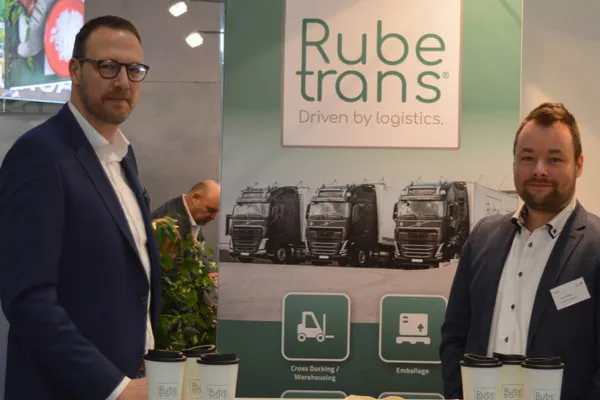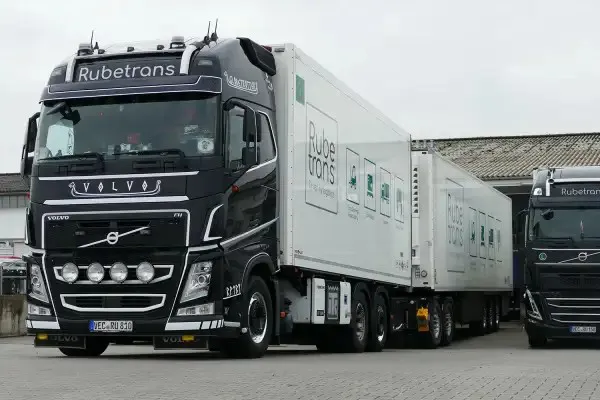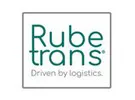Through the gradual expansion of its service range to include cross-docking and storage, Rubetrans has become one of the leading logistics providers in northern Germany for temperature-sensitive food items. Thanks to its compartmentalized storage facilities, the company, founded in 1992 and based in Steinfeld, can guarantee various temperatures according to food categories and then pick and pack the perishable goods for delivery to any central warehouse nationwide within 24 hours.
The primary focus of Rubetrans, a subsidiary of the Runden Group, is on dairy, meat, and fish rather than fruits and vegetables, Managing Director Christian Bünnemeyer explains. "The convenience sector, which includes products like bagged salads and fresh-cut fruits, has gained significant importance over the years. We have evolved from a pure FTL (Full Truckload) carrier to a comprehensive service provider for refrigerated goods, especially in the temperature ranges of 0-2 and 0-7 degrees Celsius. This has led us to manage cross-docking and refrigerated transport for major retail chains, such as Aldi Nord and Aldi Süd, as well as Kaufland."

Managing Director Christian Bünnemeyer (l) and Chris Volkmer from Rubetrans at this year's Fruit Logistica in Berlin. Cross docking for temperature-sensitive goods will continue to be the most important growth market in the coming years, according to Rubetrans management.
Despite multiple crises in recent years, the food logistics sector has developed quite strongly. "After all, people always need to eat," says the Rubetrans head. "During the pandemic, sales in the retail sector massively increased, which in turn positively impacted our order situation. By now, things have almost returned to pre-Covid levels. However, it must also be said that our industry faces strong seasonal fluctuations. A prime example is the upcoming barbecue season."
Other challenges include toll increases and driver shortages. Bünnemeyer: "We have an agreement with our customers that toll increases are covered 100 percent. Thus, there is understanding, and they are accordingly willing to absorb the additional costs. Even though we are quite well positioned regarding the driver shortage, we occasionally face driver shortages. In fact, we too feel the impact of demographic changes. Nevertheless, there is quite a good influx of applications. It's worth mentioning that about 80 percent of our drivers come from the region. We focus not only on fair pay, including several allowances, but also on internal training. This does not make us the cheapest provider on the market, but ultimately allows us to continue offering our customers the usual service, which is also appreciated accordingly."
 In the car segment, Rubetrans has already made significant progress with electric drives, having completely converted its fleet. The next step is to expand the charging stations at the Steinfeld headquarters. Pictured: The Rubetrans Ecoliner.
In the car segment, Rubetrans has already made significant progress with electric drives, having completely converted its fleet. The next step is to expand the charging stations at the Steinfeld headquarters. Pictured: The Rubetrans Ecoliner.
Sustainable conversion of the headquarters and fleet
Sustainability is another focus of the company's history. "In the next two years, we plan to equip our facilities with sustainable and regenerative fuels. Planned is a new refrigerated warehouse with autonomous energy supply using solar and wind energy as well as heat pumps." Additionally, Bünnemeyer adds that the fleet of about 80 trucks is being gradually converted. "We are increasingly trying to move away from fossil fuels, which is currently still challenging due to the limited range in heavy-duty transport. Nevertheless, we have already had the first electric truck in operation for several weeks, and two more vehicles will follow in the coming months. Furthermore, we have been able to convert nearly half of our fleet to LNG, which has allowed us to achieve a significant reduction in CO₂ emissions. For the further development of electric drives in heavy-duty transport, I see two basic requirements: First, the range needs to be increased to 600-700 kilometers, and second, an improvement of the infrastructure in Germany is necessary."
For more information:
Christian Bünnemeyer
Rubetrans Logistics GmbH & Co. KG
Gewerbering 1
D-49439 Steinfeld
Tel.: +49 5492 5574 109
Email: [email protected]
www.rubetrans.eu
